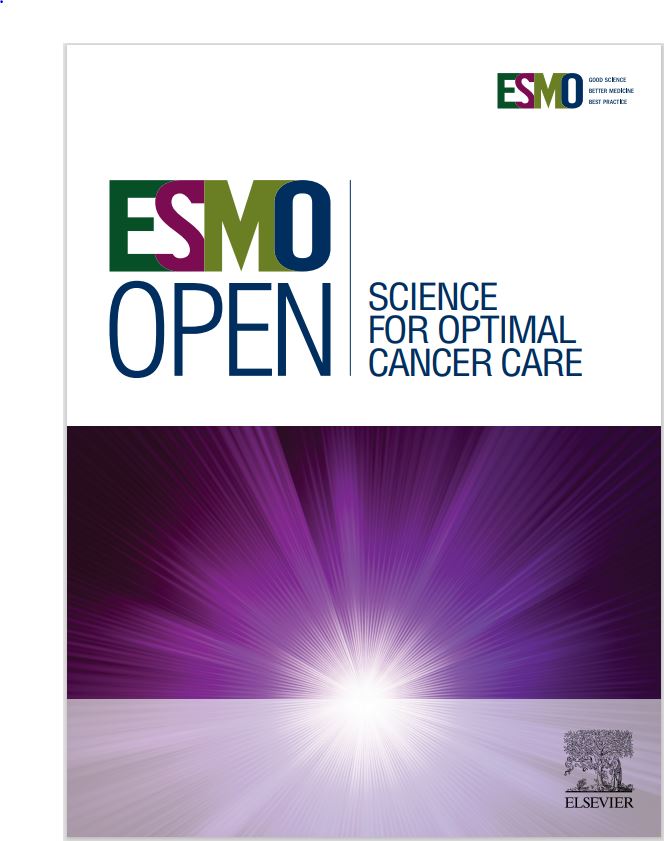The impact of co-occurring tumor suppressor mutations with mEGFR as early indicators of relapse in lung cancer
IF 7.1
2区 医学
Q1 ONCOLOGY
引用次数: 0
Abstract
Background
Lung adenocarcinoma frequently presents with EGFR mutations, often progressing on EGFR tyrosine kinase inhibitors (TKIs) despite an initial response. Progression is frequently driven by additional genetic changes, including mutations in tumor suppressor genes (TSGs). Understanding the role of these concurrent TSG mutations can help elucidate resistance mechanisms and guide the development of more effective treatment approaches.
Materials and methods
We examined survival outcomes in 483 EGFR-mutant (mEGFR) patients from the GENIE BPC non-small-cell lung cancer (NSCLC) dataset. To understand the mutational landscape and clonal dynamics, whole exome sequencing (WES) was carried out on 48 tumor samples from 16 mEGFR patients at both baseline and post-relapse. A comprehensive gene panel was applied to 200 liquid biopsy samples obtained longitudinally from 25 patients to track clonal evolution.
Results
mEGFR patients with co-occurring TSG mutations exhibited significantly worse outcomes. In the GENIE dataset, overall survival (OS) was shorter [51.11 versus 99.3 months; hazard ratio (HR) 1.8, confidence interval (CI) 1.22-2.75, P = 0.003] and progression-free survival (PFS) was reduced (9.83 versus 11.48 months; HR 1.4, CI 1.03-1.91, P = 0.026). WES analysis revealed 17 TSG mutations that were retained and showed clonal enrichment, particularly in early relapse (progression within 10 months of TKI initiation) or intermediate-stage relapse (relapse occurred between 10 and 20 months), indicated by increased variant allele frequency and their presence was strongly linked to early relapse. Longitudinal clonal studies further confirmed that TSG mutations co-occurring with mEGFR were often truncal, predominantly in early relapsers. Survival analysis using this subset of 17 TSGs showed significantly shorter OS (55.26 versus 99.3 months; HR 1.7, CI 1.12-2.65, P = 0.011) and PFS (9.67 versus 13.12 months; HR 1.5, CI 1.08-2.10, P = 0.013).
Conclusions
A set of 17 co-occurring TSG mutations has been identified as key biomarkers for early relapse in mEGFR lung adenocarcinoma. Longitudinal genomic monitoring, with a focus on clonal evolution, offers valuable insights that can inform personalized treatment strategies and potentially improve patient outcomes.
肿瘤抑制基因突变与mEGFR共同发生作为肺癌复发早期指标的影响
肺腺癌经常表现为EGFR突变,尽管最初有反应,但EGFR酪氨酸激酶抑制剂(TKIs)通常会进展。进展通常由额外的遗传变化驱动,包括肿瘤抑制基因(tsg)的突变。了解这些并发TSG突变的作用有助于阐明耐药机制并指导开发更有效的治疗方法。材料和方法我们研究了来自GENIE BPC非小细胞肺癌(NSCLC)数据集的483例egfr突变(mEGFR)患者的生存结局。为了了解突变景观和克隆动态,对来自16名mEGFR患者的48个肿瘤样本在基线和复发后进行了全外显子组测序(WES)。综合基因面板应用于从25例患者纵向获得的200个液体活检样本,以跟踪克隆进化。结果同时发生TSG突变的megfr患者预后明显较差。在GENIE数据集中,总生存期(OS)较短,分别为51.11个月和99.3个月;风险比(HR) 1.8,可信区间(CI) 1.22-2.75, P = 0.003),无进展生存期(PFS)降低(9.83 vs 11.48个月;Hr 1.4, ci 1.03-1.91, p = 0.026)。WES分析显示,17个TSG突变被保留,并表现出克隆富集,特别是在早期复发(TKI启动10个月内的进展)或中期复发(复发发生在10至20个月之间),变异等位基因频率增加,它们的存在与早期复发密切相关。纵向克隆研究进一步证实,与mEGFR共同发生的TSG突变通常是截短的,主要发生在早期复发患者中。使用这17个tsg子集的生存分析显示,生存期明显缩短(55.26个月vs 99.3个月;HR 1.7, CI 1.12-2.65, P = 0.011)和PFS (9.67 vs 13.12个月;Hr 1.5, ci 1.08-2.10, p = 0.013)。结论17组同时发生的TSG突变已被确定为mEGFR肺腺癌早期复发的关键生物标志物。以克隆进化为重点的纵向基因组监测提供了有价值的见解,可以为个性化治疗策略提供信息,并有可能改善患者的治疗效果。
本文章由计算机程序翻译,如有差异,请以英文原文为准。
求助全文
约1分钟内获得全文
求助全文
来源期刊

ESMO Open
Medicine-Oncology
CiteScore
11.70
自引率
2.70%
发文量
255
审稿时长
10 weeks
期刊介绍:
ESMO Open is the online-only, open access journal of the European Society for Medical Oncology (ESMO). It is a peer-reviewed publication dedicated to sharing high-quality medical research and educational materials from various fields of oncology. The journal specifically focuses on showcasing innovative clinical and translational cancer research.
ESMO Open aims to publish a wide range of research articles covering all aspects of oncology, including experimental studies, translational research, diagnostic advancements, and therapeutic approaches. The content of the journal includes original research articles, insightful reviews, thought-provoking editorials, and correspondence. Moreover, the journal warmly welcomes the submission of phase I trials and meta-analyses. It also showcases reviews from significant ESMO conferences and meetings, as well as publishes important position statements on behalf of ESMO.
Overall, ESMO Open offers a platform for scientists, clinicians, and researchers in the field of oncology to share their valuable insights and contribute to advancing the understanding and treatment of cancer. The journal serves as a source of up-to-date information and fosters collaboration within the oncology community.
 求助内容:
求助内容: 应助结果提醒方式:
应助结果提醒方式:


